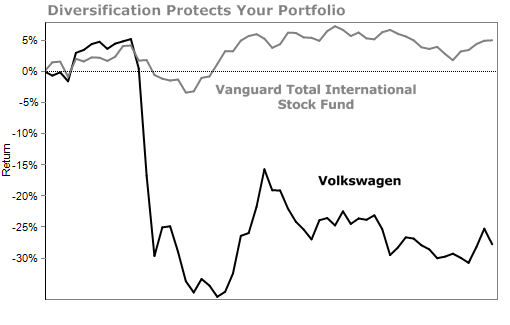It's one of the biggest cases of corporate malfeasance ever...
The revelation that Volkswagen executives may have lied about some of their cars' most highly touted features has sent the company's shares down 40%...
That sheared $30 billion off of the company's market cap. That's a lot of wealth to evaporate. It happened in a way that no one could have possibly seen coming.
I don't mean that stock movements are hard to predict. I mean that if you were a shareholder of Volkswagen, which trades as VLKAY in the United States and VOW in Germany... you had absolutely zero chance of protecting your wealth from this decline.
If you haven't been following, Volkswagen made a business out of selling "clean diesel" cars. But diesel fuel is notoriously dirty. Volkswagen claimed its technology met emission standards set by the U.S. and the European Union.
That was a lie.
It turns out that the cars' computers had a program that allowed the car to detect when it was being tested for emissions and switched it into a special "clean" mode. When researchers tested the cars on the road, they found emissions were up to 40 times higher than those allowed by law.
The company faces up to $35 billion in fines (though it'll certainly settle for less). It could face lawsuits from customers and shareholders. It'll be paying for one of the most expensive recalls ever. Maybe worst of all, it has irreparably damaged a brand that was the 35th-most valuable in the world.
There's a lesson here. And if you take it to heart, you can protect yourself and your wealth with just a little careful planning.
When good companies go bad, we all suffer from "hindsight bias."
What was nearly impossible to predict at the time looks obvious in retrospect. Moving forward, we figure we'll see the next problem coming.
Look back at a fraud like Enron, the energy company that went bankrupt in 2001. Many people feel that an analysis of its balance sheet would have revealed it was a house of cards.
Even though investors were left with nothing, it feels like it was their fault for not checking into it.
Or look back at a company like BlackBerry (BBRY). It's clear now that the 2007 release of the iPhone would destroy BlackBerry's smartphone business. Shares have gone from $138 to $7.73.
And yet... some of the smartest hedge funds in the business – like D.E. Shaw, Citadel, and Caxton – were holding shares at the top a year after the iPhone was first released.
Don't make the mistake of hindsight bias.
Believing that you can always spot trouble in your investments will just move trouble into your portfolio. Because in real time, you simply won't do so well.
A few smart short sellers did figure out Enron, but many rode it into the ground. Even people inside Enron didn't know what was happening. Only 20 top employees out of 21,000 were high up enough to know the stock was about to collapse.
The Enron 401(k) accounts showed employees had 62% of their retirement savings in Enron stock. A lawsuit claimed $1 billion in losses by employees. Of course, they lost their jobs as well.
These were folks who worked at every level of the company. Some had worked there for decades. They knew their jobs inside and out. Still, they didn't know what would happen to the savings they had piled in shares.
Meanwhile, the top 20 employees sold $130 million worth of shares in Enron's last year.
The investigation into Volkswagen continues. At this point, it is unclear how much the company's management knows or if this was the work of a rogue engineer. Even the now-ousted CEO may not have known what was in store for his company.
If you were a Volkswagen shareholder, no amount of research or insight could have led you to protect yourself. There was nothing you could do.
As investors, we all must admit we are not the smartest people in the world. There will be unanticipated disasters in your portfolio. You cannot avoid it.
The only protection is diversification.
I know that diversification is not the most exciting topic. I know most investors "know" they should be diversified.
But many investors are overweight certain investments. It's important to use scandals like Volkswagen to remind investors just how bad it can get.
If you held shares of Volkswagen, you lost 40%. But if Volkswagen were one of 20 stocks in your portfolio, you only lost 2%.
Or, take another example: Volkswagen was one of more than 300 holdings in the Vanguard Total International Stock Fund (VXUS). Which performance looks more appealing to you?
 Never overload your portfolio with a single stock, no matter how much you believe in it. Devils lurk in the details of any business... and you aren't privy to all the information you need.
Never overload your portfolio with a single stock, no matter how much you believe in it. Devils lurk in the details of any business... and you aren't privy to all the information you need.
If you hold a lot of your savings in the stock of the company you work for, sell your shares and diversify now.
For those who really want to be invested, don't go over 10% of your savings. For most, I'd suggest you don't hold more than 5%. If you're an executive and you want to retain voting rights, talk to a financial advisor about hedging the position.
The only way to protect yourself against the unexpected is proper diversification. If the next Volkswagen is in your portfolio, you won't know until it's too late.
What We're Reading...
*** This is the definitive book on Enron: The Smartest Guys in the Room.
*** Something different: Astronomers photograph the birth of planets for the first time.
